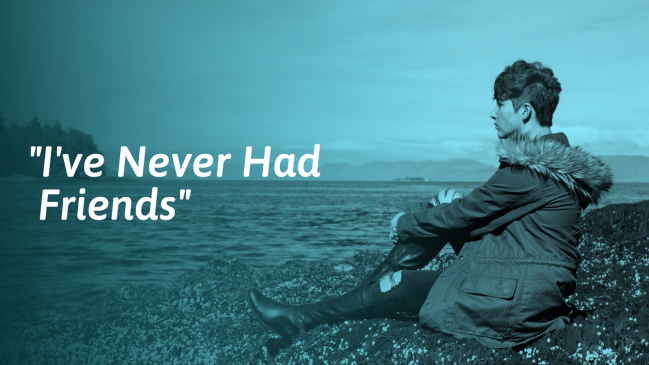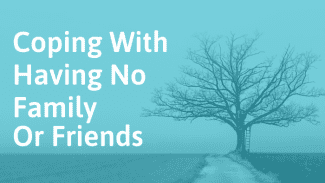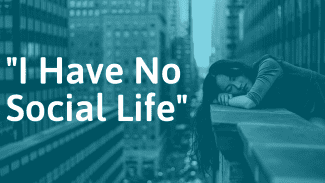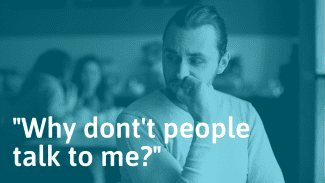“I can’t make friends with anyone. I’ve tried, but no one seems interested in spending time with me. After all these failures I’ve lost my motivation to even try. How do other people build friendships?”
If you’ve never had friends, you may feel as though there’s something “wrong” with you, or that you are destined to go through life alone.
And maybe you do have challenges others don’t. Social anxiety, upbringing, past trauma, trust issues, or mental or physical disabilities can make it feel close to impossible to make friends.
However, it can be helpful to remember that there are many others with similar challenges to you who have learned to make friends.
It takes many small steps over a long period of time, but I can tell you this:
I have many examples from people I’ve worked with that have had the odds stacked against them. Despite this, they’ve been able to build meaningful friendships.
In this guide, you’ll learn possible reasons why you’ve never had any friends, and the practical steps you can take to build a social life.
Sections
Possible reasons why you’ve never had friends
1.You didn’t have any good role models
Our first role models are our parents or caregivers.
Ideally, a parent should teach their child:
- How to start conversations
- How to listen and show interest in others
- What to do when you disagree with other people
- How to take turns and play fairly with others
If yours didn’t teach you these skills, you probably found it hard to socialize as a child and might still have the same problems today.[6]
2. You had few opportunities to meet people
For example:
- You might have gone to a very small school, or been homeschooled, meaning you didn’t get to mix with many other children.
- You may have moved around frequently as a child or teenager, so you didn’t have a chance to know anyone very well.
- You may have been raised in a strict family that limited your social opportunities.
- You may have chosen a career path that doesn’t give you a chance to meet many people or involves a lot of lone work.
3. You have always been shy
Shyness is linked with poor social skills. If you are naturally shy, you may find it harder to make friends.[7] Research shows that shyness is dispositional. This means it appears at a young age, and many shy children grow into shy teens and adults.[7]
4. You have been bullied
If you were bullied or abused as a child, you are more likely to have problems making friends.[8],[9] Being treated badly by others can make you reluctant to trust and befriend new people as an adult.
5. You have autism spectrum disorder (ASD)
People with autism spectrum disorder (ASD) often lack the social skills they need to make friends.[10] For example, they may struggle to read facial expressions and not understand how to take turns in conversation.
ASD is a developmental disorder. This means you are born with it. However, some people aren’t diagnosed until they are adults. If you think you may have ASD, try this free screening test.
6. You have ADHD
If you have attention deficit hyperactivity disorder (ADHD), you are prone to impulsive and hyperactive behavior. You might also have problems with concentration.
ADHD symptoms can make socializing difficult.[11] For example, you may have trouble focusing on what other people are saying during a conversation.
It’s possible to be diagnosed as an adult. Check out this online screening test if you think you might have ADHD.
7. You have social anxiety disorder (SAD)
If you have SAD, you probably spend a lot of time worrying about what other people think of you. It may feel safer to avoid people altogether rather than risking embarrassment or rejection. SAD can start in childhood and, if not treated, can become a lifelong condition that gets in the way of making friends.[12]
8. You have an avoidant attachment style
The interactions we have with our parents when we are babies shape the way we form attachments to other people. If your parents didn’t meet your emotional needs, you might have learned that relationships are difficult and that other people cannot be trusted. As a result, you may have developed an avoidant attitude towards other people, even if part of you would love to have friends.[13]
You can learn more about having a fearful-avoidant attachment style on Healthline.
9. You are an introvert
It’s a myth that introverts are asocial or don’t want to make friends. They often enjoy socializing, usually in small groups and in quiet settings. But if you are highly introverted, connecting with other people might be a challenge.
This may be because:
- You hate small talk, which is often necessary if you want to get to know someone.
- You feel drained quickly in social settings, which limits the amount of time you can spend with potential friends.
- You feel as though other people, especially extroverts, don’t understand you.
- You need a lot of time alone.
Those around you might misinterpret your behavior. They may think you prefer to avoid social situations altogether. If you feel that no-one understands you, it’s easier to withdraw completely.
How to make friends when you’ve never had any
Many people are friendless at some point in their lives. This can happen for many reasons. For example, it’s common for friends to fall out of touch when one of them moves to a new area or starts a family.
People in this position need to meet potential new friends. They might also need to improve their social skills if they have some bad habits that drive others away.
However, if you have never had friends, your situation is different. Because you haven’t had any opportunities to practice getting to know people and forming friendships, you’ll need to spend time working on basic skills, such as making conversation and asking someone to hang out with you.
You might also have extra challenges. For example:
- You may feel embarrassed because you haven’t had friends before, which can make you self-conscious. You might worry that people will discover that you don’t have friends and that they will think you are weird.
- Unlike many people, you don’t have the option of meeting new friends through your existing friends.
- You may be more vulnerable to toxic friends, because you don’t have first-hand experience of spotting the warning signs.
- You might have deep-seated trauma or difficulties that stem from early childhood. For example, if you were severely bullied, you will need to work on coming to terms with your past while practicing social skills and meeting new people.
Here are some practical steps you can take to start making friends:
1. Practice essential social skills
Start by learning the skills you need to be more comfortable in social situations.
These skills include:
- Making eye contact
- Making yourself look approachable
- Making small talk
- Keeping a conversation going
Check out our list of the best social skills books for adults.
Don’t try to make sudden, drastic changes. Gradually move beyond your comfort zone and practice these skills in your everyday life.
For example, if you struggle to make eye contact with anyone, challenge yourself to make eye contact with one new person every day, such as a cashier or the receptionist at your office.
2. Find like-minded people
It’s simpler to make friends with someone when you have a shared hobby or passion. You’ll know from the start that you have something in common, which makes starting a conversation easier.
Look for meetups, classes, and groups that are centered around your interests.
You could try:
- Meetup or Eventbrite to find meetups in your local area
- Facebook groups that are based around a particular topic or hobby
- Apps for people who want to make friends, such as Bumble BFF. See this list of apps and websites for making friends.
- Volunteer. Look on the VolunteerMatch website for opportunities.
Try to find a recurring meetup rather than one-off events. When you see the same person every week, you’ll have a chance to get to know them.
See our guide on how to meet like-minded people for more advice.
3. When you click with someone, invite them out
If you’ve had an interesting conversation with someone and you think they’ve enjoyed talking to you, get their number.
For example, you could say:
“It’s been a lot of fun talking to you. Let’s swap numbers so we can keep in touch.”
Once you have their number, you can use your mutual interest to follow up later. For example, you could send them a link to an article you think they’d like to read.
If they seem enthusiastic, the next step is to invite them to spend time with you. When you are getting to know someone, inviting them along to a specific activity or event, such as a workshop or lecture, can be less awkward than just asking them to hang out.
See this guide on how to make new friendst.
4. Get to know new acquaintances on a deeper level
Self-disclosure builds intimacy and trust, which are important for satisfying friendships.[14] To turn an acquaintance into a friend, you need to learn more about them while sharing things about yourself.
You can do this by:
- Having balanced back-and-forth conversations where you open up to your friend and encourage them to do the same in return.
- Disclosing feelings and opinions on everyday topics like sport and films when you are first getting to know someone, then opening up about deeper issues like fears and ambitions when you’ve spent more time together.
- Asking questions that encourage more meaningful conversations. Read our guide on how to have deep conversations, which includes detailed examples.
- Practicing active listening. Give the other person your full attention when they speak. If you appear distracted, they will probably shut down.
See this article on how to bond with someone for more tips.
As you get to know someone, they might ask about your other friends. You don’t have to tell them that you’ve never had a social life, but if it comes up in conversation, try to be honest. Give them a brief explanation, such as “I haven’t met the right people yet” or “I grew up in a small town, so I never had much of a social life.” If you become close friends, you can give them a more detailed explanation later.
If someone tries to make you feel inferior for never having had friends, they are best avoided. A good friend will not put you down
5. Keep in touch
To keep your friendship alive, you need to talk to each other regularly.[15] As a general rule, try reaching out to casual friends once per month. Contact close friends — and people you’d like to know better — once or twice per week. Read this guide on how to stay in touch with people without coming off as needy or annoying.
6. Learn how to avoid toxic people
If you are very eager to make friends, you might be tempted to hang out with anyone who takes an interest in you. This is understandable, especially if you have been feeling lonely for a long time.
Many people settle for fake friends or frenemies because they think it’s better than having no friends at all. Don’t fall into this trap. Learn to spot the signs of toxic friendships and be selective in your social life.
7. Get professional help if necessary
Most people can learn to improve their social skills and make friends, even if they’ve never had a social life before. But it’s a good idea to see a doctor or therapist if:
- If you have tried to improve your social skills but haven’t made any progress.
- If you have or think you have a condition that makes it hard for you to socialize, such as social anxiety disorder or ADHD. It can be helpful to work with a doctor or therapist who can recommend therapy, medication, or both.
- You have a history of trauma or abuse.
- If you think you have an avoidant attachment style that stops you from getting close to other people. This is a problem that often requires therapy to fix.[13]
If you prefer online therapy, you can try Betterhelp.
Common questions
Is it possible to be happy without friends?
Some people are content to be alone; they have a “preference for solitude.”[1] However, this doesn’t necessarily mean they are happy without friends. Research shows that social connections are key to our well-being [2] and that interacting with others improves our mood.[3]
Is it normal to never have had friends?
At least 9% of adults have no friends at all.[4] Psychologists don’t yet know how many people have never had friends. However, some children do not make friends,[5] and it seems probable that they still find it difficult as adults.
Why have I never had any friends?
If your parents did not teach you basic social skills, you might have always found it hard to make friends. Other possible reasons include a shy nature, a lack of opportunities to practice social skills, a developmental disorder, a history of abuse, or living in a place with no like-minded people.






I am 65 and have had maybe a half dozen friends over a lifetime. I used to want friends but I don’t understand what’s expected…ever…it’s like a dog being introduced to hamsters and asked to entertain them or go to their parties. And nothing clicks. I’m extremely intelligent but by the time I form a sentence to join in a group conversation, they’ve already moved on. So I sit like a lump. I’m good at meeting people and starting a conversation and asking about their interests and all of that. I have learned that. I am truly interested in their lives but it is like we have no mental world in common. Does that make sense?
yes it sounds a lot like my experience. I can’t express how many times people have let me know in many different ways they show and express how much they dislike me. 90 per cent of the time it with -in seconds of meeting me regardless of the circumstances. The other ten percent are friends for a while and then ghost me. I can remember walking out of High School graduation and thinking that I wasn’t invited anywhere to celebrate. On my 50th Birthday I received no calls no cards Etc. Tomorrow is my 67 th birthday and nothing. I’m ok looking smart, generous, fun loving, very supportive. I’ve tried everything I can think of the change this dynamic and It seems as if it is all for nought. I don’t have a poor outlook on life because of this and wake up everyday glad to be alive.